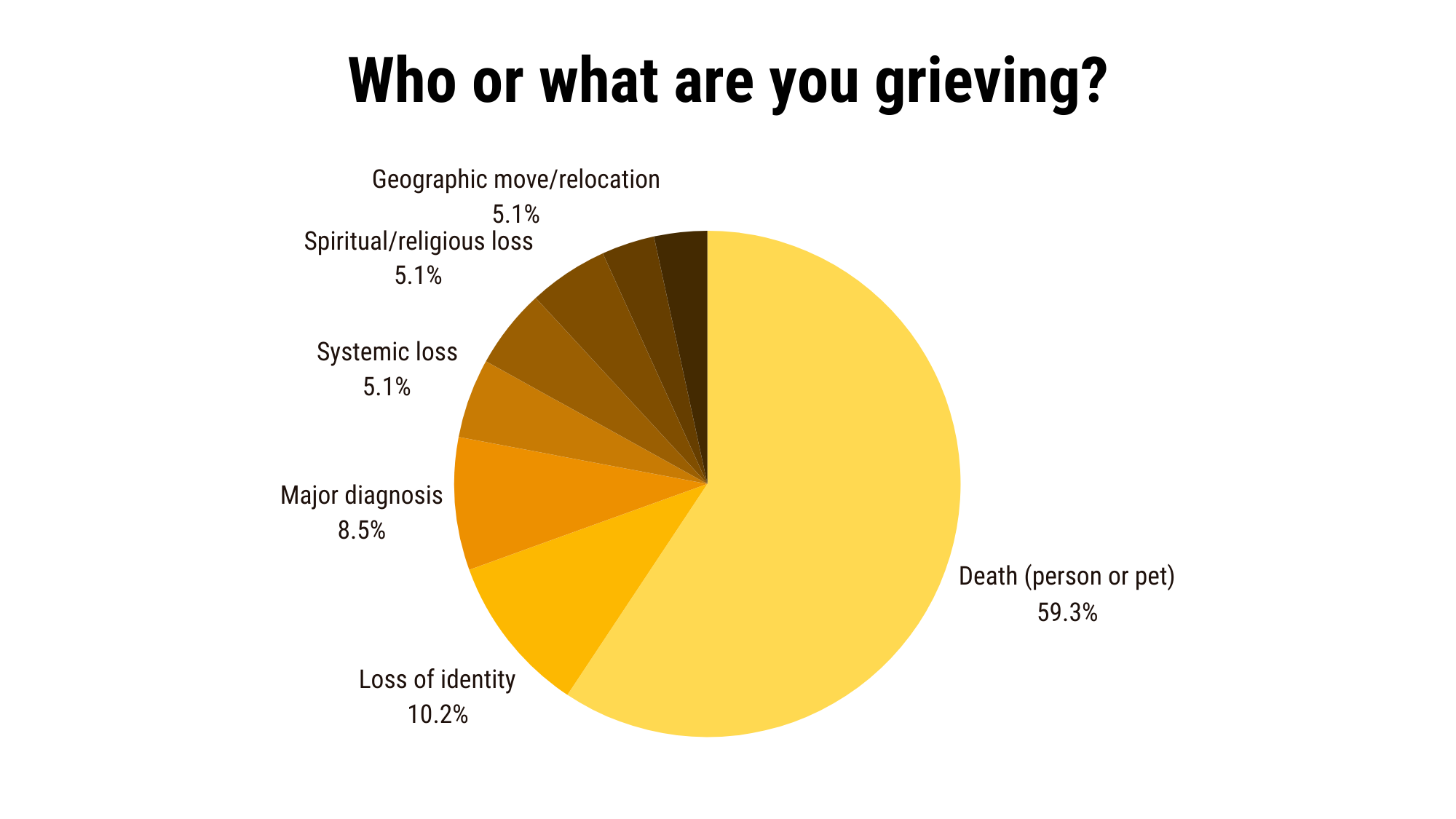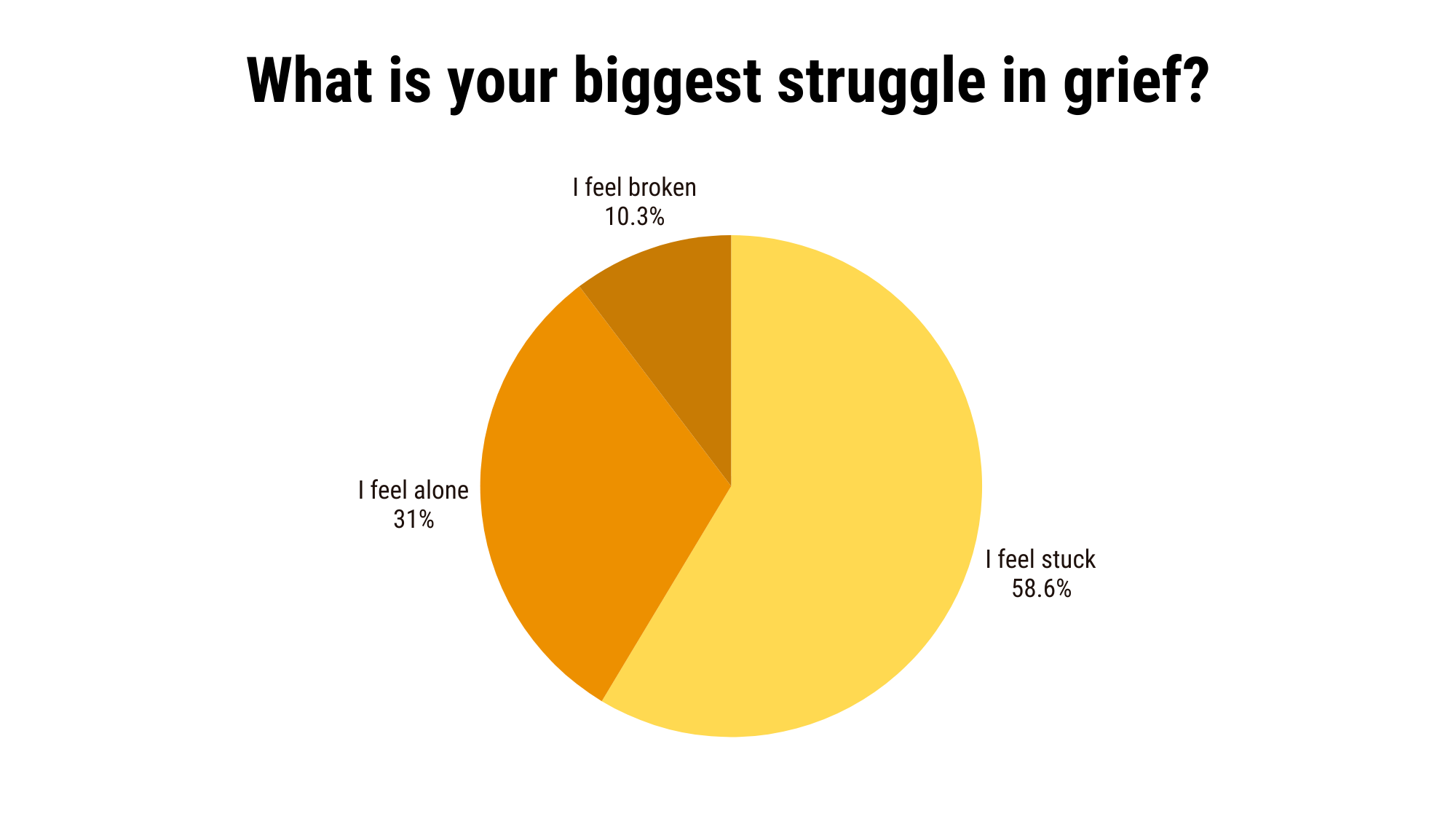What Grievers REALLY Want: I Asked 100+ Grievers About Online Grief Support. Here’s What They Told Me.
Since 2020, I’ve had the privilege of working closely with grieving individuals through my online program, Life After Loss Academy. Each time I open enrollment, I ask would-be students to share their experiences and desires through a brief survey. Their responses help me understand what grievers truly want—and need—from online grief support.
The insights from over 100 grievers, spanning all different kinds of loss, are both heartbreaking and illuminating. While these grievers live in different countries and have been coping with loss anywhere from a couple of weeks to multiple years, their struggles and desires share powerful commonalities.
Here’s what they told me—and how it shaped my online course + community, Life After Loss Academy.
1. Most grievers are mourning loss due to death, but identity is a notable second.
When people think of grief, death of a person or pet is often the first thing in their minds. But grief takes many forms, often tied to other life-altering experiences.
Here’s how the grievers I surveyed described their losses:
Death of a person or pet: 59.3%
Loss of identity: 10.2%
Major diagnosis (such as terminal illness or chronic condition): 8.5%
Systemic loss (related to gender, race, class, ability, or age): 5.1%
Spiritual or religious loss: 5.1%
Geographic move or relocation: 5.1%
Financial loss: < 5%
Divorce or breakup: < 5%
Simply put, grievers say:
“Yes, I am grieving a loss due to death, but I am also grieving a part of who I am.”
2. More than half of grievers report feeling stuck or lost.
The pain of grief manifests in many ways, and I hear three phrases more frequently than anything others in my work as a grief coach: “I feel stuck,” “I feel alone,” and “I feel broken.”
Here’s what grievers I surveyed reported as their biggest struggle:
I feel stuck: 58.6%
I feel alone: 31%
I feel broken: 10.3%
The overwhelming theme? A sense of being stuck, lost, and disoriented. While loneliness and devastation are big themes in life after loss, feeling incapable of moving forward—or uncertain of where to go from here—reigns supreme.
It’s like grievers are saying:
“I absolutely feel broken and alone, but more than that, I don’t know how to see a way out of this.”
3. Grievers want a combination of practical tools and emotional support.
When asked what they wanted most from online grief support, two words stood out: tools and hope. Grievers want practical, actionable resources to navigate their pain and hope that there is more to life than pain and suffering they’re experiencing right now.
Here’s what the grievers I surveyed shared they wanted most:
I want tools: 29.5%
I want hope: 27.9%
I want help: 21.3%
I want to move forward: 21.3%
This is significant, because many people view grief support as shoulder-patting “there there’s” and sharing grief stories in a support circle of folding chairs. And while those things are helpful, my survey shows that most grievers want to feel like they’re doing something to help themselves get unlost and unstuck.
Framed another way, grievers are saying:
“My top priority is having practical, actionable tools that give me hope. I’m not asking for my pain to disappear; I’m looking for guidance on how to carry it.”
How these survey results shaped my online grief support course, Life After Loss Academy
Life After Loss Academy was designed with grievers’ struggles desires in mind. Every part of the program reflects what grievers told me they need most.
Here’s what you’ll find inside:
Step-by-step video lessons with practical, actionable tools
These tools—including reframes, journaling prompts, rituals, and guided visualizations—help you manage your emotions and take meaningful steps forward.
A focus on diverse types of loss
While most students inside Life After Loss Academy are grieving the death of a person or pet, the lessons cater to all types of loss including divorce/breakup, diagnosis, systemic loss, and spiritual loss.
It also includes a dedicated module on the grief of identity loss, so you can grieve not only the loss you faced, but also the person you can no longer be.
A built-in community for connection and support
The course includes a private Facebook group and weekly live coaching calls with me, so you don’t have to navigate grief alone. We regularly share significant grief milestones and tips for getting through the day-to-day.
A roadmap for moving forward
By the end of Life After Loss Academy, you’ll have a clear, personalized plan to fold your loss into your life and move forward in the way that makes the most sense to you. The result is a rich, meaningful future that honors what you’ve been through while also regaining a sense of peace, joy, and purpose.
Your voice matters: Take the survey and win a free spot in the course!
Every griever’s experience is unique, and I’m on a mission to keep listening and learning. That’s why I’m inviting you to take my grief support survey.
As a thank-you, you’ll be entered into a giveaway to win a FREE spot in the next 10-week group program of Life After Loss Academy, which opens on January 16. Our first group coaching call is January 30.
Reading this after January 16, 2025? Take the survey anyway and you’ll be entered to win a spot in the next 10-week group program of Life After Loss Academy. You can view this year’s enrollment schedule here.
Don’t want to wait? Join Life After Loss Academy at any time here.
Closing Thoughts
Grief isn’t something to fix or overcome—it’s something we learn to live with. This wisdom, gathered from more than 100 grievers, taught me that what matters most when it comes to online grief support is combining step-by-step guidance with helpful tools to get grievers unstuck and moving forward. Doing this helps them not only cope with death and other devastating losses, but also gives them the hope that they need to build beautiful lives after loss.
If you’re seeking support, know that you’re not alone.
I hope you’ll join me in Life After Loss Academy or take the survey to share your story. Together, we can create online grief support that makes our offline experiences of loss not only survivable, but rich in peace, purpose, and joy.




